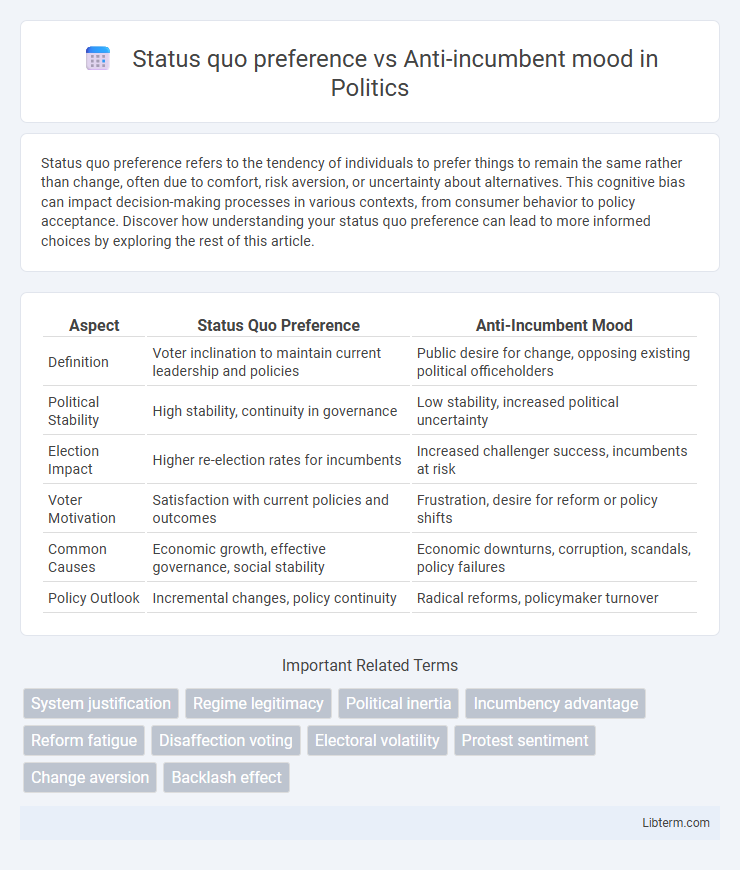Status quo preference refers to the tendency of individuals to prefer things to remain the same rather than change, often due to comfort, risk aversion, or uncertainty about alternatives. This cognitive bias can impact decision-making processes in various contexts, from consumer behavior to policy acceptance. Discover how understanding your status quo preference can lead to more informed choices by exploring the rest of this article.
Table of Comparison
| Aspect | Status Quo Preference | Anti-Incumbent Mood |
|---|---|---|
| Definition | Voter inclination to maintain current leadership and policies | Public desire for change, opposing existing political officeholders |
| Political Stability | High stability, continuity in governance | Low stability, increased political uncertainty |
| Election Impact | Higher re-election rates for incumbents | Increased challenger success, incumbents at risk |
| Voter Motivation | Satisfaction with current policies and outcomes | Frustration, desire for reform or policy shifts |
| Common Causes | Economic growth, effective governance, social stability | Economic downturns, corruption, scandals, policy failures |
| Policy Outlook | Incremental changes, policy continuity | Radical reforms, policymaker turnover |
Understanding Status Quo Preference
Status quo preference reflects individuals' tendency to favor existing conditions or policies due to perceived risks and uncertainties associated with change. This cognitive bias often results in resistance to new reforms, even when alternatives may provide benefits, as people prioritize stability and predictability. Understanding status quo preference is crucial for policymakers aiming to design communication strategies that address fear of change and highlight the advantages of proposed innovations.
Defining Anti-Incumbent Mood
Anti-incumbent mood refers to a prevalent public sentiment characterized by dissatisfaction with current officeholders, driving voters to favor change over continuity. This attitude often emerges during periods of economic downturn, political scandals, or perceived government inefficiency, amplifying voter desire to replace incumbents regardless of their individual performance. Unlike status quo preference, which reflects contentment with existing governance and a tendency to re-elect current officials, anti-incumbent mood promotes electoral volatility and heightened support for challengers.
Historical Contexts of Status Quo Preferences
Status quo preference historically reflects a societal tendency to favor existing policies and institutions during periods of stability and economic growth, as seen in post-World War II Western democracies where citizens often resisted drastic changes. This preference contrasts with anti-incumbent moods that emerge primarily during economic crises, political scandals, or social upheavals, exemplified by the widespread electoral backlash against incumbents during the Great Depression or the Watergate scandal. Understanding these historical contexts reveals how periods of relative prosperity reinforce status quo preferences, while crises amplify demands for political change.
Triggers of Anti-Incumbent Sentiments
Economic downturns, corruption scandals, and perceived government inefficiency are primary triggers of anti-incumbent sentiments, eroding public trust in current leadership. High unemployment rates and inflation notably amplify dissatisfaction, prompting voters to seek change over maintaining the status quo. Media coverage and social movements further intensify negative perceptions, accelerating shifts in political attitudes away from incumbents.
Psychological Factors Behind Status Quo Preference
The psychological factors behind status quo preference include loss aversion, cognitive dissonance reduction, and the need for certainty, which reinforce individuals' tendency to favor existing conditions over change. This preference is driven by a desire to avoid the perceived risks and uncertainties associated with altering the current state. Unlike the anti-incumbent mood that reflects dissatisfaction and desire for political change, status quo preference highlights an inherent psychological resistance to disruption in decision-making processes.
Social and Economic Drivers of Anti-Incumbent Mood
Status quo preference reflects voters' inclination to maintain current policies and leadership, often driven by perceived economic stability and social cohesion. In contrast, the anti-incumbent mood arises from economic dissatisfaction such as unemployment, inflation, or income inequality, coupled with social factors like political distrust, social fragmentation, and unmet public expectations. Economic downturns and growing social grievances amplify anti-incumbent sentiments, fueling demand for political change and reform.
Impact on Electoral Outcomes
Status quo preference often leads voters to support incumbent candidates, stabilizing electoral outcomes and reinforcing existing political power structures. Anti-incumbent mood, characterized by voter dissatisfaction and desire for change, increases the likelihood of electoral turnover and can catalyze significant shifts in government composition. The interplay between these sentiments critically influences election results, voter turnout, and party strategies during campaigns.
Media Influence on Public Opinion
Media influence significantly shapes public opinion by either reinforcing status quo preference or amplifying anti-incumbent mood through selective framing and agenda-setting techniques. Studies reveal that positive media coverage tends to bolster incumbent approval ratings, while critical reporting fuels public dissatisfaction and political skepticism. The polarization of media outlets intensifies these effects, creating echo chambers that deepen citizens' alignment with either maintaining current leadership or demanding political change.
Policy Implications for Political Leaders
Political leaders must recognize that status quo preference reflects voters' desire for stability and predictable governance, leading to sustained support for existing policies. In contrast, an anti-incumbent mood signals widespread dissatisfaction and demands for change, prompting leaders to prioritize reform and address public grievances. Tailoring policy strategies to these sentiments enhances electoral resilience and effective governance.
Balancing Change and Stability in Governance
Status quo preference reflects citizens' desire for stability and continuity in governance, favoring existing policies and leadership to maintain predictable social and economic conditions. Anti-incumbent mood emerges from dissatisfaction with current government performance, driving demand for political change and reform to address perceived inefficiencies or corruption. Effective governance balances these opposing forces by implementing gradual reforms that ensure both stability and responsiveness to public calls for accountability.
Status quo preference Infographic

 libterm.com
libterm.com